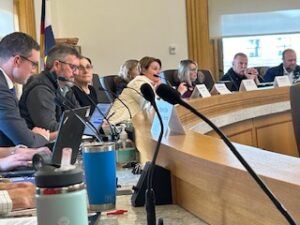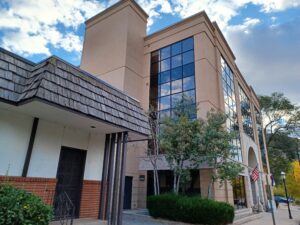A state commission on Friday recommended a 10-point plan to reduce tax pain caused by rising property valuations, including continuation of soon-to-expire residential tax breaks, a decrease in commercial property tax rates and a flexible cap on property-tax increases.
Though the 10 policy proposals, which now will head to the Colorado Legislature, include three studies and several longer-term fixes, they also include reductions to rising residential and commercial property tax bills that, if enacted, will be felt right away. Commission member Loren Furman, president/CEO of the Colorado Chamber of Commerce, argued those breaks are needed to try to get two interest groups to pull back a November ballot proposal that would set a 4% cap on property-tax revenue increases.
However, the leader of one of those interest groups, Advance Colorado President Michael Fields, said that he believes the package is too weak and vague and that he and Colorado Concern will continue forward with their ballot plan. Thus, it will be up to legislators to decide how much change they are willing to make, knowing that voters could choose on their own to curtail revenue to protect themselves from future spikes in property-tax bills.
Why the recommendations were made
Legislators created the commission in a special session in November after state residents learned that property-tax bills for their homes were set to rise by an average of more than 40%, with many commercial property owners facing similar spikes. Another bill in that session limited average residential property-tax bill increases to between 19% and 25% this year but did nothing to help commercial-property owners or ensure that such volatility wouldn’t cause more big increases in the future.
After meeting for three months, the 19-member commission appointed by legislative leaders and Gov. Jared Polis recommended two changes that could limit the tax bills that Coloradans will have to pay in 2025. One is to continue the residential tax breaks being given this year — a subtraction of $55,000 from each home’s actual value for assessment purposes and a reduction of the property-tax assessment rate from 6.765% to 6.7%.
The other proposal would maintain the reduced nonresidential property tax rate at 27.9% this year and then drop it to 26.8% in 2025, 25.7% in 2027 and 25.5% in 2029. Legislators would backfill local governments for lost revenue for a limited amount of time if the changes’ impacts were significant, but that would offer rare aid to commercial property owners who pay four times the assessment rates of homeowners.
“I believe this commission should demonstrate a meaningful effort toward tax relief … right now, and this would be our way of doing that,” Furman told fellow commissioners. “I think we need to remember what we’re up against in November and make recommendations with those in mind.”

Loren Furman is president and CEO of the Colorado Chamber of Commerce.
A proposal for a property-tax revenue cap
The commission also recommended that the Legislature impose a cap on property-tax increases going forward but opted for an adjustable cap that gives local governments more flexibility in collecting and using revenues during times of property valuation spikes. Under the plan, the cap could rise by a variable such as population increase plus consumer price index, would be tailored for each local jurisdiction rather than statewide and would exempt expenditures necessitated by wildfires, floods or other emergencies.
Mesa County Commissioner Cody Davis, a property-tax commission member, said such a cap could provide relief that homeowners and business owners seek so badly without tying a cap to a rigid statewide formula that doesn’t reflect differences in regional economies.
“I think if we don’t push some form of flexible cap like this, the voters will push a cap in the fall,” Davis said.
The recommendations also call for further study on three potential solutions that could lead to further targeted tax breaks, most notably the idea of offering every homeowner a tax reduction on their primary home or on a long-term rental property they own, much like the Senior Homestead exemption now offers to older Coloradans. Another study would examine the possibility of offering means-tested relief for low- or fixed-income property owners during times of valuation spikes, while a third would examine separating property-tax assessments for schools and for all other local governments.
Ways to ease property-tax pain

Members of the Commission on Property Tax ask questions during its initial meeting in December.
Finally, the commission recommended that the Legislature consider several other previously discussed ideas that would let property owners take the hit on rising bills over longer periods of time or would help them ease into such bills in other ways. Those are:
- The creation of an allowance for property owners to pay their bills in 12 monthly increments rather than in one large lump sum;
- A “smoothing” option under which portions of property-tax revenue increases above a certain level could be paid over a multi-year period — or in which property-tax revenue declines during recessions could be spread over multiple years to ease significant government revenue losses;
- An expansion of an existing program, which allows homeowners to defer payment of as much as $10,000 in property taxes if valuations rise more than 4%, to all homeowners regardless of how much property valuations rise and how much they owe; and,
- A “participatory taxation” mandate that local governments must hold public meetings to inform property owners if taxes are going to rise above a certain level.
All 10 of the recommendations head now to the Legislature, where the 100 state senators and representatives will decide which, if any, that they would like to run as bills and consider passing before the May 8 adjournment of the 2024 session. While the Legislature has a packed calendar, including debates on contentious subjects like oil-and-gas restrictions and taxation of short-term rental properties, it’s likely it will seek to advance some measures at the request of financially strained Coloradans.
Some ideas failed to get support
The recommendations received various levels of support from the commission, whose members include legislators, county commissioners, business representatives, a teachers’ union leader and a local fire chief.

Commercial buildings like these in Glenwood Springs would feel impacts from the Commission on Property Tax recommendations.
Proposals to expand the tax-deferral program and to allow for monthly tax payments, for example, were unanimous, and the graduated commercial property-tax decrease and idea to study targeted relief for low-income homeowners both got overwhelming support. But the proposals to study tax breaks for one home per owner statewide and to implement an adjustable property-tax cap each got at least seven “no” votes, potentially presaging tougher roads through the Legislature.
Two of the 12 proposed recommendations failed and will not be forwarded to legislators. One would have created a break for certain small businesses, and the other would have studied whether property-tax bills could be set by limited allowable growth to government budgets rather than having government budgets be set by property-tax base growth.
“I really believe that we are on the right track,” said Weld County Assessor Brenda Dones, a commission member, of the portfolio of recommended changes.
Pushback from ballot-initiative proponents
But Fields did not agree and said that his coalition is planning to continue to push its 4% cap as a ballot initiative that would only allow governments to grow property-tax revenue by more if they receive permission from voters at an election. That in turn may lead the Bell Policy Center to continue pushing its countermeasure seeking to create a new tax that would be assessed on luxury homes if property-tax-cut measures cause revenues to fall.
In a news release, Fields criticized the recommendations as offering a lack of true tax relief, saying that efforts like allowing residents to “pay unaffordable property tax hikes in ‘12 easy payments’” are more empty rhetoric than needed assistance. Too much of the commission’s efforts were directed at protecting revenue streams for local governments rather than at bringing down soaring property-tax bills, he said.
“The problem isn’t government’s cash flow, it’s the amount of cash that taxpayers are flowing to government,” Fields said. “Instead of vague ‘solutions’ and more studies, Coloradans want real solutions now.”
